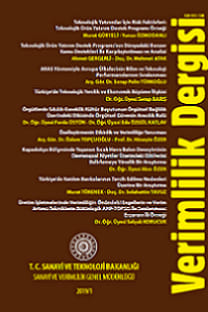Altı Sigmanın Temelleri
Günümüzün hızla küreselleşen dünyasında, işletmeler yarlıklarını sürdürmek için verimliliklerini sürekli arttırmak zorundadır. Altı Sigma, işletmelerde kalite artırımı konusunda son yıllarda popüler olan bir kalite yönetimi yaklaşımıdır. Önemli ölçüde istatistiksel temellere dayanan Altı Sigma yaklaşımının, önemsenmesi gereken ve bu makalenin konusunu oluşturan bir yönetsel ve örgütsel yanı da vardır. Bu makalede, Altı Sigma'nın bir kalite yönetimi sistemi olarak temel özelliklerinden ve uygulayıcılarından bahsedilmiş, diğer güncel yönetim yaklaşımlarından farklı ve benzer yönleri tartışılmış, Altı Sigma başarı faktörleri irdelenmiş ve Altı Sigma'nın işletme performansına etkisi anlatılmıştır. İşletmelerde uygulanacak ampirik bir Altı Sigma çalışmasının temelde teorik altyapısını oluşturan bu çalışma, günümüzde sıkça tartışılan Altı Sigma yaklaşımı ile ilgili önemli bir teorik eksikliği gidermeyi amaçlamaktadır.
Anahtar Kelimeler:
altı sigma, toplam kalite yönetimi, verimlilik
Fundamentals of Six Sigma
In today's ever globalizing world, in order to survive, organizations have to increase their productivity continuously. Six Sigma is a popular approach emerging in the last couple of years to enhance the quality in organizations. Although Six Sigma is largely based on statistics, it has an organizational and managerial side that needs to be considered and that makes the topics of this article. In this article, the basic characteristics of Six Sigma have been discussed, the major differences and similarities with other popular managerial approaches are outlined, the success factors in Six Sigma are covered and the possible impacts of Six Sigma on organizational performance are argued. This study lays the theoretical foundations of future empirical Six Sigma studies in organizations, also satisfies existing theoretical works about today's popular managerial approach Six Sigma in Turkish literature.
Keywords:
six sigma, total quality management, productivity,
___
- 1. Adams, Cary W., Gupta, Praveen, Wilson, Charles E,"Six Sigma Dep loyment", Butterworth-Heinemann, Elsevier Science, USA, 2002
- 2. Akın, B. (2003), "Altı Sigma Deneyim Paylaşım Sempozyumu", 28 Mart 2003 Boğaziçi Üniversitesi
- 3. Antony, J. ve Banuelas, R. (2002),"Key Ingredients for the Effective Implementation of Six Sigma Program", Measuring Business Ex cellence, (6:4), 20 - 27
- 4. Banuelas, R. ve Antony, J. (2002), "Critical Success Factors for the Successful Implementation of Six Sigma Projects in Organiza tions" The TQM Magazine, (14:2), pp: 92 - 99
- 5. Crompton Corporation (2004), "Six Sigma: Quality Processing Through Statistical Analysis", Plastics Additives & Compounding, July/August 2004
- 6. Elliott, G. (2003), "CE To Six Sigma", Industrial Engineer, October 2003
- 7. Johnson, A. and Swisher, B. 2003, How Six Sigma Improves R&D, Research Technology Management, Vol. 46, No. 2,12-15
- 8. Klefsjo, B., Wiklund, H. ve Edgeman, R. (2000), "Six Sigma Seen As a Methodology for Total Quality Management", Measuring Busi ness Excellence, (5:1), pp:31-35
- 9. Kwak, Y. ve Anbari, F. (2004),"Benefits, Obstacles and Future of Six Sigma Approach", Technovation, (1:8)
- 10. Linderman, K., Schroeder, R., Zaheer, S. Ve Choo, A. (2003), "Six Sig ma: A Goal Theoretic Perspective", Journal of Operations Manage ment, (21:), 193-203
- 11. Maleyeff, J., Kaminsky, F.C. (2002), "Six Sigma and Introductory Statistics Education", Education and Training, (44:2), pp: 82-89
- 12. Makrymichalos, M., Antony, J., Antony, F., Kumar, M. (2005),"Statisti cal Thinking and Its Role for Industrial Engineers and Managers in the 21st Century", Managerial Auditing Journal, (20:4), pp. 354-363
- 13. Pande, P., Neuman, R. ve Cavanagh, R. (2003), "Altı Sigma Yolu", Klan Yayınları
- 14. Pfeifer, T., Reissiger, W., Canales, C (2004), "Integrating Six Sigma With Quality Management Systems" The TQM Magazine, (16:4), PP: 241-249
- 15. Reed, M. (2000), "Six Sigma Eavesdropping on the Net" Quality Australia, (15:1), pp: 10-15
- 16. Rockart,J. (1979)"Chief Executives Define Their Own Data Needs" Harvard Business Review, (57:2), pp: 238 - 241
- 17. Şenkayas, H., (2003), "Bilgi Teknolojilerinin Üretim Yönetiminde Kullanımı: EDI Sisteminin Türkiye'deki İşletmelerde Performan sa Etkisi" Yayınlanmamış Doktora Tezi, Ankara Üniversitesi Sosyal Bilimler Enstitüsü, Ankara
- 18. Watson, J. (2003), "Satisfaction Through Six Sigma", Engineered Systems
- ISSN: 1013-1388
- Başlangıç: 2004
- Yayıncı: T.C. SANAYİ VE TEKNOLOJİ BAKANLIĞI STRATEJİK ARAŞTIRMALAR VE VERİMLİLİK GENEL MÜDÜRLÜĞÜ
Sayıdaki Diğer Makaleler
Konutlarda Verimli Aydınlatma İlkeleri
Aykut Hamit TURAN, Hüseyin ŞENKAYAS
Doğal ve Sosyal İmkanların Zaman-Mekan Boyutunda Eşitsiz Dağılımı ya da Bölgesel Eşitsizlikler
Modern Yönetime Doğru Olmazsa Olmaz Koşul: Etkin Devlet
Konfeksiyon İşletmelerinde Çalışma Yaşamı Kalitesi ve Analizi
